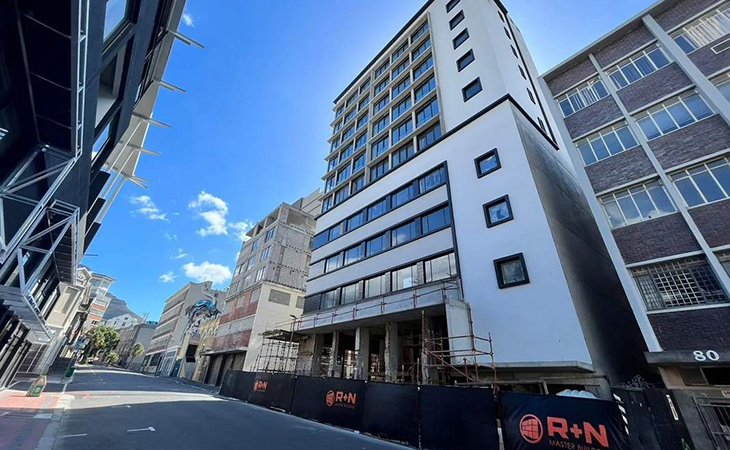
Cape Town is known for its breathtaking scenery and iconic Table Mountain. However, it also just unveiled a groundbreaking architectural marvel.
Located at 84 Harrison St., The Hemp Hotel – which is 12 stories high – proudly holds the title of the world’s tallest building constructed primarily with industrial hemp. But what makes this an even more amazing achievement is the materials used in its construction are carbon-negative, allowing it effectively capture more carbon with the building walls than the actual emissions it produced during its construction.
President of South Africa, Cyril Ramaphosa, truly believes that the cannabis and hemp industry could help add 130,000 jobs in places such as Afrimat Hemp, which is the producer of the so-called “HempCrete” blocks that were used to make the hotel.
Using South African hemp only, these blocks were crafted and produced solely by Afrimat Hemp, using a blend of water, lime, hemp, and a cement binder. These versatile blocks serve not only corporate clients but also contribute to the construction of numerous social housing projects that are being done in South Africa and the neighboring region of Mozambique.
The bring the Hemp Hotel to fruition, Afrimat Hemp joined forces with Wolf Architects, which is a renowned firm based in Cape Town. Although the company acknowledges that hemp construction comes with a 20% higher price tag compared to traditional materials, they also understand that this is an exceptional opportunity in the corporate world’s increasing urgency to combat climate change as well. By selling carbon credits associated with their buildings, Afrimat Hemp provides a very unique approach to carbon offsetting, changing the usual focus on trees.
Afrimat Hemp’s carbon consultant, Wihan Bekker, explained to African News, “We can fund forests, or we can fund someone to live in a hemp house. It’s the same principle.”
Data from the company reveals that a modest 430-square-foot house, which is equivalent to 40 square meters, built with hemp-based techniques emits 30 fewer tons of carbon compared to conventional methods. This reduction is equivalent to the carbon sequestration that a mature tree achieves throughout its entire lifetime, primarily through its root system.
The Hemp Hotel now stands as a symbol of innovation and sustainability, showcasing the immense potential of hemp as a versatile and eco-friendly building material. With its remarkable views and pioneering mode of construction, this architectural masterpiece is set to captivate visitors and inspire a new era of environmentally conscious design.
See more about The Hemp Hotel in the video below:
What are your thoughts? Please comment below and share this news!
True Activist / Report a typo


